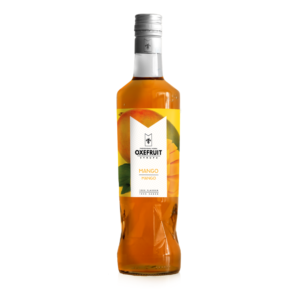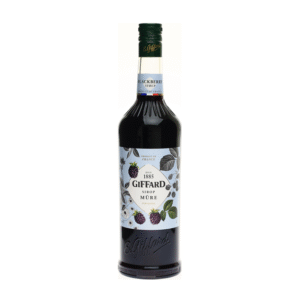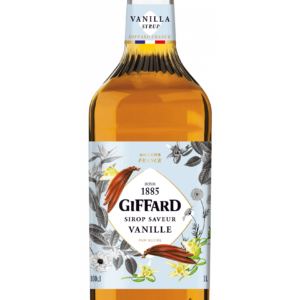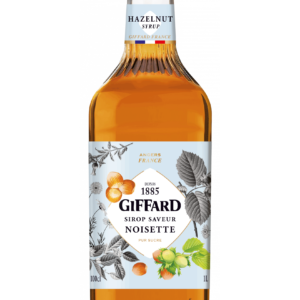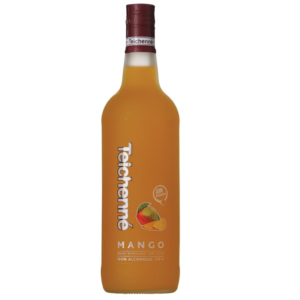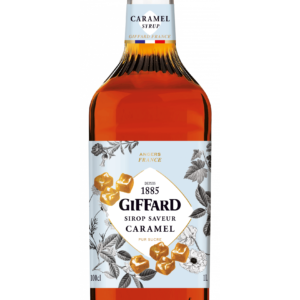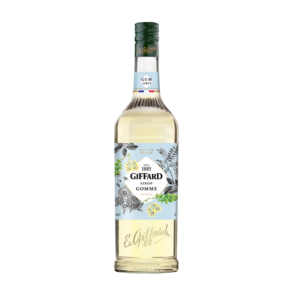Showing all 7 resultsSorted by popularity
Syrup – The Complete Guide
TL;DR: In Short
- Syrup is characterized by its concentrated sweetness and versatility in cocktail making
- Primarily made from sugar and water, and defined by its viscous consistency
- Found in several styles, including simple syrup, flavored syrups, and specialty cordials
- Best enjoyed as a cocktail ingredient and can be experienced in a Daiquiri or Old Fashioned
Disclaimer: This guide is intended for informational purposes for adults over 18 years of age. Vault of Spirits encourages responsible consumption of alcohol.
Introduction to Syrup
Syrup has a rich history and fascinating craftsmanship behind it. From its origins in ancient kitchens to its global popularity in today’s mixology scene, this cocktail essential has evolved to become one of the world’s most valued bar ingredients.
This guide provides insight into the production, flavor profiles, and enjoyment of syrups, whether you’re a beginner or experienced enthusiast.
How Did Syrup Originate?
From Past to Present
The concept of syrup dates back thousands of years, with early versions appearing in ancient Egypt and China, where honey was the primary sweetener.
The word “syrup” itself comes from the Arabic “sharab” meaning “beverage.” With the development of sugar refining in medieval times, sugar-based syrups began to emerge as culinary and medicinal ingredients.
By the 17th and 18th centuries, as sugar became more widely available, syrups became essential components in early cocktails and mixed drinks.
Which Historical Milestones Have Shaped Syrup?
The invention of the refined sugar process in the 15th century dramatically changed syrup production, making it more consistent and widely available.
The cocktail revolution of the 19th century elevated syrups from mere sweeteners to sophisticated flavor components, with bartenders creating house-made varieties.
The mid-20th century saw commercial syrup production soar, though many of these products contained artificial ingredients and preservatives.
The craft cocktail renaissance of the early 2000s brought a return to artisanal, natural syrups made with quality ingredients.
How Has Syrup Influenced Cultural Traditions?
In the Middle East, fruity and floral syrups have long been used to create refreshing non-alcoholic beverages during religious celebrations and hot summer months.
In the American South, syrups became central to hospitality traditions, with sweet tea and mint juleps requiring perfectly balanced sweeteners.
Italian café culture embraced syrups for flavoring coffees and sodas, creating distinctive regional preferences.
Caribbean rum traditions rely heavily on various syrups, from simple sugar syrups to complex spiced varieties, reflecting the region’s rich history with sugar production.
Why Is Syrup Popular Today?
The modern craft cocktail movement has elevated syrups to an art form, with bartenders creating bespoke blends using fresh ingredients and innovative techniques.
Health-conscious consumers have driven demand for natural, organic syrups made without high-fructose corn syrup or artificial additives.
Home mixologists increasingly create their own syrups, encouraged by the availability of recipes and the desire for creative control over their drinks.
Global flavor exploration has expanded syrup varieties, incorporating ingredients from diverse culinary traditions into modern cocktail culture.
How Is Syrup Made?
Which Raw Materials Are Used for Production?
Syrups begin with a foundation of sweeteners and water, but the possibilities for additional ingredients are virtually endless.
Primary ingredients:
- Sugar – The backbone of most syrups, providing sweetness and body
- Water – The solvent that dissolves sugar and extracts flavors from other ingredients
- Flavorings – Fruits, herbs, spices, or flowers that contribute aromatic compounds
How Does the Fermentation Process Work?
Unlike alcoholic beverages, traditional cocktail syrups don’t undergo fermentation. However, some specialty syrups may incorporate fermented components.
Certain specialty syrups like shrubs involve a cold fermentation process where fruit, sugar, and vinegar develop complex flavors over time.
Fermented honey syrups (mead reductions) use the natural fermentation of honey to create deeper, more complex flavor profiles.
Some modern mixologists experiment with kombucha, kefir, or other fermented bases to create probiotic syrups with unique tangy notes.
Which Production Techniques Are Used?
Most syrups don’t involve distillation, but the production methods vary widely depending on the desired result.
Common production methods:
- Hot Process – Heating sugar and water to ensure complete dissolution, ideal for simple syrups and those requiring extraction of harder materials
- Cold Process – Stirring sugar into room temperature water until dissolved, preserving delicate flavors of herbs and flowers
- Infusion – Steeping flavoring ingredients in syrup base to extract their aromatic compounds
What’s the Significance of Aging?
Unlike spirits, most syrups aren’t aged intentionally, as freshness is typically desirable. However, some variations benefit from limited aging.
Gomme syrup (containing gum arabic) develops a silkier texture after resting for several days.
Spiced syrups often benefit from a few days of integration, allowing the flavors to meld and soften.
Most syrups have limited shelf lives compared to spirits, with natural syrups typically lasting 2-4 weeks refrigerated before quality declines.
Which Regions Are Known for Syrup?
Where Are the Best Variants Produced?
Unlike geographically protected spirits, quality syrups emerge from various regions known for their particular ingredients or traditions.
Vermont and Quebec are renowned for their maple syrups, harvested from sugar maple trees in the spring.
The Caribbean produces exceptional cane syrups and traditional varieties like falernum, reflecting centuries of sugar cultivation.
Mediterranean countries excel in fruit syrups, with Italy’s traditional fruit cordials and France’s complex flavor combinations leading the way.
The Pacific Northwest has become a hub for artisanal berry syrups, utilizing the region’s abundant wild and cultivated fruits.
How Do Geography and Climate Affect the Taste?
The terroir of botanicals used in syrups significantly influences their flavor profiles.
Citrus fruits from tropical regions often provide brighter, more intense flavors than those grown in temperate climates.
Alpine herbs used in syrups typically have more concentrated essential oils due to their harsh growing conditions.
Regional water sources with different mineral contents subtly affect syrup’s taste, especially in minimally processed varieties.
What New Trends Are Seen in Syrup Production?
Experimental producers are incorporating savory elements like vegetables and umami flavors into modern syrup creations.
Sustainable practices have led to “root-to-fruit” approaches, utilizing all parts of botanical ingredients.
Alternative sweeteners like monk fruit, erythritol, and allulose are gaining popularity for lower-calorie syrup options.
Functional ingredients such as adaptogens, CBD, and botanicals with purported health benefits are emerging in premium syrup lines.
What Do Various Quality Designations Mean?
Unlike highly regulated spirits, syrups have fewer standardized quality designations, but several terms indicate production methods.
“Simple syrup” traditionally refers to a 1:1 ratio of sugar to water, while “rich simple syrup” indicates a 2:1 ratio.
“Artisanal” or “craft” often suggests small-batch production with natural ingredients, though these terms aren’t regulated.
“Organic” certification requires adherence to organic growing standards for all agricultural ingredients.
“Natural” typically means free from artificial flavors, colors, or preservatives, though regulation of this term varies by country.
How Does Syrup Taste?
What Characterizes the Typical Flavor Profile?
The baseline flavor of unflavored syrups is straightforward sweetness, but proper balance and texture are crucial for quality.
Typical aromatic profiles:
- Simple syrups – Clean sweetness with subtle vanilla or caramel notes depending on the sugar source
- Fruit syrups – Concentrated fruit essence balanced with sweetness and often a hint of acidity
- Spiced syrups – Warm, aromatic notes with layered complexity from botanical infusions
How Does the Flavor Vary Between Different Styles?
Simple syrups offer pure sweetness with textures varying from light to rich depending on the sugar-to-water ratio.
Fruit syrups range from bright and acidic (raspberry, citrus) to deep and jammy (blackberry, fig).
Herb-infused syrups can be delicate and floral (lavender, chamomile) or bold and savory (rosemary, sage).
Specialty syrups like orgeat (almond), falernum (spiced lime), or grenadine (pomegranate) have distinctive, complex profiles that balance sweetness with other flavor dimensions.
How Does the Flavor Develop Over Time?
Unlike aged spirits, most syrups don’t improve with extended time. Instead, they follow a different lifecycle.
Many infused syrups reach peak flavor after 24-48 hours, when botanical compounds have fully extracted.
Over weeks, fresh ingredient syrups may lose their brightness and develop duller flavor profiles.
Extended storage can lead to crystallization in high-sugar syrups or fermentation in those with fresh fruit components.
What Signs Reveal High Quality?
Superior syrups show perfect clarity unless intentionally cloudy (as with orgeat or some fruit syrups).
The texture should be smooth and fluid, neither too thin nor sticky, with no sugar crystals or separation.
High-quality flavored syrups have pronounced, authentic aromas that match their source ingredients.
Premium products maintain a perfect balance between sweetness and flavor, avoiding the cloying quality of mass-produced alternatives.
How Is Syrup Best Enjoyed?
What’s the Optimal Serving Method?
Syrups are rarely consumed alone but shine as supporting players in cocktails and other beverages.
Precise measurement is crucial – typically 1/4 to 3/4 oz per cocktail, depending on the drink’s balance.
For maximum integration, add syrups early in the cocktail building process, allowing them to mix fully with other ingredients.
In non-alcoholic applications, dilution with still or sparkling water in a 1:4 or 1:5 ratio creates refreshing beverages.
Which Glass and Temperature Are Ideal?
Since syrups are ingredients rather than stand-alone beverages, glassware depends on the final drink being served.
Store syrups refrigerated at 38-42°F (3-6°C) to extend shelf life and prevent fermentation or mold.
When adding to hot beverages like coffee or tea, warm the syrup slightly first to prevent temperature shock.
For cocktail preparation, room temperature syrups incorporate more easily than cold ones, especially when mixing with spirits.
How Do You Taste Like an Expert?
Professional syrup evaluation begins with visual assessment – checking clarity, color, and viscosity.
Aroma evaluation requires small, gentle sniffs to detect volatile compounds without overwhelming the senses.
For tasting, dilute the syrup with still water (1:3 ratio) to moderate sweetness and better assess flavors.
Consider not just flavor intensity but also flavor duration, complexity, and how flavors evolve on the palate.
Which Dishes Complement Syrup?
Beyond beverages, culinary applications for cocktail syrups are numerous.
Fruit syrups make excellent glazes for poultry or desserts, while spiced varieties enhance marinades.
Herb-infused syrups can elevate salad dressings when combined with quality vinegar.
Simple syrups can be brushed on layer cakes to add moisture and subtle sweetness.
Which Cocktails Can Be Made with Syrup?
Which Classic Cocktails Should You Know?
Simple syrup is a fundamental ingredient in countless classic cocktails, balancing acidity and adding texture.
Old Fashioned
- Ingredients: 2 oz bourbon or rye whiskey, 1/4 oz simple syrup, 2-3 dashes Angostura bitters, orange peel
- Preparation: Combine ingredients in a rocks glass with ice, stir until chilled, and garnish with expressed orange peel
- History: One of the earliest defined cocktails, dating to the early 1800s, originally called the “Whiskey Cocktail”
Which Modern Cocktails Are Worth Trying?
Contemporary bartenders have expanded syrup’s role, creating complex, layered sweeteners for innovative drinks.
The Penicillin, created by Sam Ross in the early 2000s, uses honey-ginger syrup to complement smoky and malty Scotch whisky.
Tommy’s Margarita substitutes agave syrup for triple sec, creating a more transparent expression of tequila’s flavors.
The Bees Knees combines gin with honey syrup and lemon juice for a sophisticated yet simple balance of floral and citrus notes.
How Is Syrup Enjoyed Neat?
While syrups aren’t typically consumed straight, they have applications beyond cocktails.
Diluted with still or sparkling water (1:4 ratio), flavored syrups create refreshing non-alcoholic beverages.
Added to iced tea or coffee, syrups provide consistent sweetness without the dissolution issues of granulated sugar.
A splash of fruit or spiced syrup can transform inexpensive sparkling wine into a festive, flavorful beverage.
Which Homemade Variants Can You Experiment With?
Creating custom syrups at home allows for endless creativity and personalization.
Seasonal fruit syrups capture fleeting flavors at their peak – try strawberry-rhubarb in spring or cranberry-orange in winter.
Herb garden excesses make excellent infusions – basil, mint, or lemon verbena create vibrant, aromatic syrups.
Spice cabinet explorations yield warming blends like cardamom-cinnamon or star anise-vanilla for complex flavor foundations.
What Should You Know Before Buying Syrup?
Which Details Should You Pay Attention to When Buying?
Ingredient transparency is crucial – quality syrups list all components, ideally with real sugar rather than corn syrup.
Check the sugar content and concentration – professional-grade syrups typically contain more sugar (2:1 ratio) for better cocktail integration.
Shelf stability matters – natural products without preservatives require refrigeration and have shorter lifespans.
For flavored varieties, look for “extract” or “essence” on labels, which often indicate artificial flavoring rather than real ingredients.
What Do You Get for Your Money in Different Price Categories?
Budget syrups ($5-10/bottle) typically contain artificial flavors and preservatives but offer consistency and convenience.
Mid-range options ($10-20/bottle) usually feature natural ingredients but may use shortcuts like flavor extracts rather than full infusions.
Premium syrups ($20-30/bottle) should contain only natural ingredients, often organic or locally sourced, with complex, authentic flavors.
Artisanal small-batch products ($30+/bottle) frequently feature unusual ingredients, proprietary recipes, or limited seasonal offerings.
How Is Syrup Stored Correctly?
Most natural syrups require refrigeration after opening and typically last 2-4 weeks when properly stored.
Higher sugar concentrations (2:1 ratio) last longer than standard simple syrup (1:1 ratio) due to increased osmotic pressure.
Clean bottles and tools prevent contamination, which can cause fermentation or mold growth.
Some shelf-stable commercial syrups contain preservatives and can be stored at room temperature, but check manufacturer guidelines.
Is Syrup a Good Investment?
Unlike collectible spirits, syrups aren’t typically investment items due to their limited shelf life.
However, the investment in quality syrups pays dividends in superior cocktails and beverages.
Creating homemade syrups offers excellent value, with small investments in fresh ingredients yielding large volumes of product.
Some limited-edition syrups from famous bartenders or establishments may have collector appeal, though primarily for their containers.
Which Brands Do We Recommend?
What’s Best for Beginners?
Monin offers a wide range of flavors with consistent quality and good availability, making it ideal for home bar beginners.
Small Hand Foods produces historically-accurate syrups perfect for classic cocktails, with clear labeling and straightforward applications.
Liber & Co creates approachable yet high-quality options with excellent recipes on their website for guidance.
Jack Rudy Cocktail Co. makes concentrated syrups that last longer and require smaller quantities, ideal for occasional mixologists.
What Will Impress Enthusiasts?
Giffard produces exceptional fruit and floral syrups with remarkable authenticity and complexity.
Liquid Alchemist offers intensely flavored, perfectly balanced specialty syrups crafted by professional bartenders.
BG Reynolds focuses on traditional Tiki syrups with authentic methods and ingredients for tropical cocktail perfectionists.
El Guapo Bitters creates regionally-inspired syrups with unique flavor combinations not found in mainstream offerings.
Which Bottles Are Most Sought After?
Orgeat Works’ T’Orgeat is considered by many bartenders to be the gold standard of almond syrups, with a cult following.
Rare Hawaiian varieties of sugar cane syrups from small producers command premium prices for their distinctive mineral notes.
Limited seasonal releases from artisanal producers like Pratt Standard and Royal Rose create excitement among collectors.
Collaboration syrups between famous bartenders and producers often become sought-after for their unique flavor profiles.
Where Do You Get the Most for Your Money?
DIY simple syrup offers unbeatable value – a cup of sugar and a cup of water yields approximately 12 oz of syrup for pennies.
Trader Joe’s unexpected syrups, particularly their seasonal offerings, deliver excellent quality at reasonable prices.
Cocktail & Sons provides complex, chef-driven syrups at mid-range prices that outperform many premium competitors.
Fee Brothers offers reliable, affordable options that work well for everyday mixing without breaking the bank.
Frequently Asked Questions
What Is Syrup?
In cocktail contexts, syrup refers to a sweetening agent made by dissolving sugar in water, often infused with additional flavors from fruits, herbs, spices, or other botanicals.
Syrups provide balanced sweetness, flavor, and a smooth mouthfeel to beverages, acting as crucial building blocks in cocktail construction.
How Is Syrup Produced?
Basic syrups are produced by combining sugar and water in specific ratios (typically 1:1 or 2:1) and heating until fully dissolved.
Flavored varieties incorporate additional ingredients through infusion, maceration, or cooking methods to extract aromatic compounds.
Commercial production often includes stabilizers or preservatives, while artisanal producers typically rely on high sugar content and refrigeration for preservation.
What Characterizes Syrup?
Quality syrups exhibit viscous consistency, perfect clarity (unless intentionally cloudy), and balanced sweetness that enhances rather than overwhelms other flavors.
They provide texture and body to cocktails, contributing to mouthfeel in ways that granulated sugar cannot.
The best examples capture authentic flavor essences of their source ingredients without artificial notes or excessive sweetness.
Where Can You Buy Syrup?
Specialty liquor stores and cocktail supply shops offer the widest selection of premium and craft syrups.
Online retailers like Amazon, Cocktail Kingdom, and direct-from-producer websites provide access to brands not available locally.
Gourmet food stores and well-stocked supermarkets typically carry basic varieties and some popular flavored options.
Farmers markets and artisanal food fairs often feature small-batch producers creating unique seasonal varieties.
